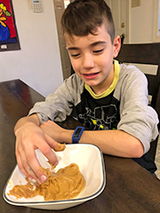Learning to Live With Food Allergies: Dominic's Story
Learning to Live With Food Allergies: Dominic's Story
One family shares its story about how a small, cross-disciplinary clinic at Children's Hospital of Philadelphia has had a mighty impact on their son's quality of life.

We were referred to CHOP's Food Allergy Bravery Clinic by our local allergist in Allentown.
After months of debating if the FAB Clinic would be effective for our son Dominic, and worth the drive and time to travel to CHOP, we finally made the decision to attend after Dominic had a panic attack at a local ice cream shop. Someone in front of him had ordered peanut butter ice cream and he was terrified he might accidently be exposed to peanuts – one of his worst allergens.
We knew this was beyond something we could deal with alone. His anxiety had only gotten worse as he got older and better understood the severity of his food allergy. We started attending the weekly FAB Clinic at CHOP in November 2019.
Precautions don't always work
A month later, we went on a family cruise. We took many precautions to keep Dominic safe during our trip – we called ahead to notify staff of our son's allergy, we documented his allergy with medical officials on-board, and spoke directly to wait staff each day.
Despite all of this, Dominic had his first anaphylaxis reaction onboard -- the day before his 9th birthday. When hives suddenly appeared all over his body, we knew to give Dominic his EpiPen and Benadryl to calm his body's reaction immediately; then rushed him to the ship's medical station to be monitored until he recovered.
When we returned home, we continued with Dominic's care plan created by the FAB Clinic. Though still scared from his recent anaphylactic reaction, Dominic continued to follow the practices his clinical team prescribed, complete the daily Bravery Challenges and utilize the coping skills he'd learned at CHOP.
New tools to fight food allergies – and panic
Dominic learned how to keep himself safer: washing his hands before and after eating, avoiding cross-contamination from serving utensils, and learning how to approach food workers in public to ask if any foods included peanuts.
And if something with peanuts accidently touched him? Dominic learned not to panic; instead to wash the area thoroughly, inform his parents or teachers of the exposure and remain calm if any minor skin reactions did occur.
Setting goals
Throughout treatment, our family worked with Dominic and the FAB Clinic team to set regular and ongoing goals. One of Dominic's goals was to be able to safely and confidently eat lunch with his friends at school -- at the non-food allergy lunch table. While the COVID-19 school shutdown prevented him from doing this in the Spring, he has been practicing at home with his three siblings. They'll all eat peanut butter sandwiches, and he'll have ham and cheese – all at the same table. He's been doing great!

Our long-term treatment goals remain the same: for Dominic to be able to live a more normal life, to know how to safely navigate his food allergies, and to better manage his food-related anxiety and related mental health issues. We want him to have the tools necessary to understand his anxiety, how to manage it, and how to live safely with his life-threatening allergy.
Without the FAB Clinic, I do not think Dominic would be as confident as he is today. Not only did it help lessen his allergy-related anxiety, but he has practiced tools of anxiety management that can be applied to many aspects of his life.
Dominic's therapy with the FAB Clinic is now complete, and we no longer come to CHOP weekly for appointments with the FAB Clinic team. However, our relationship with CHOP is far from over – these clinicians have become part of our family! Dominic will continue to be followed by CHOP Allergy as he gains skill and confidence to manage his food allergies as he gets older. And I can always call if I have questions.
So much has changed in the past year for Dominic. No longer is he a timid, fearful and anxious child waiting for his next allergic reaction. Today, he is more confident and relaxed. He asks questions of people making his food, has tools to deal with any accidental exposures that may occur, and feels more comfortable knowing we are all looking out for him too.
--Antoinette, Dominic's mom